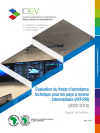The African Development Bank (AfDB) Regional Member Countries are categorized as low, middle, and high-income based on their per capita Gross National Income. Despite their relatively high per capita income level, most middle-income countries (MICs) in Africa remain vulnerable to external shocks from the global commodity and financial markets. Furthermore, they face unique development challenges such as rising income inequality and pockets of poverty, high youth unemployment and persistent infrastructure deficits. To improve the effectiveness of its development support to African MICs, the AfDB set up the Middle-Income Countries Technical Assistance Fund (MIC-TAF or “the Fund”) in 2002. It was intended to enhance the volume, quality, competitiveness and development effectiveness of the Bank’s operations in MICs.
The Fund gives grants for project preparation, capacity building and institutional strengthening, economic and sector work as well as activities that promote private sector development, based on the specific needs of the client countries. Between 2002 and 2018, the Fund disbursed close to USD 143 million across 185 projects in 19 countries. The countries that were eligible to access the Fund were: Algeria, Angola, Botswana, Cameroon, Cape Verde, Congo Republic, Egypt, Equatorial Guinea, Gabon, Kenya, Libya, Mauritius, Morocco, Namibia, Nigeria, Senegal, Seychelles, South Africa, Swaziland, Tunisia, and Zambia.
In 2018, Independent Development Evaluation (IDEV) at the AfDB launched an evaluation of the MIC-TAF. The objective of this evaluation was to examine the extent to which the MIC-TAF had achieved its original goal of delivering development results in beneficiary countries during the entire period of the Fund’s existence (2002 to 2018).
The evaluation used mixed methods, including qualitative assessments and data analyses. An in-depth portfolio review was conducted to closely examine the extent to which the Fund has generated loan operations for the Bank. Furthermore, document reviews, benchmarking with comparable organizations, structured interviews and focus group discussions were conducted to assess the effectiveness of the Fund. The evaluation team carried out field missions and user and beneficiary surveys to triangulate and validate the data.
The evaluation found that:
- The Fund and its operations were relevant, though the Fund lacked a clear strategic focus.
- The Fund was effective, based on its ability to achieve one of its main objectives, namely improving the Bank’s portfolio in MICs; albeit with an appreciation of the Fund’s limited capacity to generate development outcomes.
- The Fund was inefficient. The long delays in responding to, and processing, MIC-TAF requests have had an adverse impact on the timely completion of investment projects and capacity-building initiatives.
- In terms of governance, the lack of strategic focus in the evolution of the Fund caused it to turn it into a financing instrument that supplements the Bank’s administrative budget.
- On sustainability the evaluation could not provide a final rating due to the limited number of Project Completion Reports (PCRs) available.
The evaluation concluded that the MIC-TAF is an effective tool for the Bank, and its continued operations have the potential to increase the Bank’s development effectiveness in the MICs. As such, the evaluation provides several recommendations (at the strategic and operational level) to be considered by AfDB Management:
- Clarify the institutional arrangement of the Fund and establish an effective management;
- Enhance the financial sustainability of the Fund and set-up a Project Preparation Facility specifically for MICs;
- Improve the Fund’s guidelines and establish a stronger quality assurance process for MIC grants;
- Increase support to ongoing Bank lending operations and consider Bank execution of selected projects when necessary.
Task Manager: Mirianaud Oswald Agbadome, Principal Evaluation Officer
| Attachment | Size |
|---|---|
| 2.63 MB | |
| 290.89 KB | |
| 415 KB | |
| 2.32 MB |


